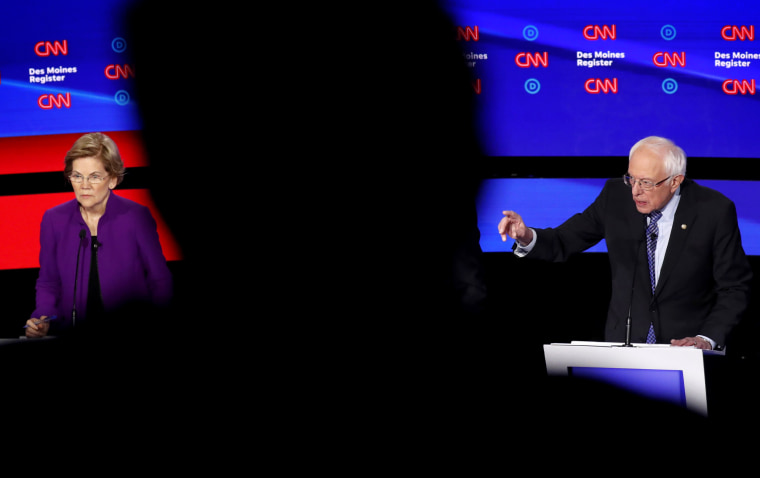DES MOINES, Iowa — Sens. Bernie Sanders, I-Vt., and Elizabeth Warren, D-Mass., have once again concluded they're better off together than apart, continuing a decadelong alliance even as they vie with each other for the Democratic presidential nomination.
That doesn't mean they're happy about it.
Supporters in both camps are still fuming after this week's dustup on gender and electability, which seeped into public view after Tuesday night's debate when Warren didn't shake Sanders' hand and the two had a tense exchange.
But the progressive senators are bound by strategic imperative and a dozen years of mutual support, which have helped both to advance their careers and their agendas and could help maintain an uneasy détente today — one that's needed to take on the moderate national front-runner, former Vice President Joe Biden.
"The alternative is Biden or [Michael] Bloomberg is the nominee. It's that simple," said Rebecca Katz, a progressive campaign strategist. Warren and Sanders "are both progressives who believe in the movement. And if there's some sort of mutual destruction, then a corporate moderate can win."
People close to both campaigns say any infighting would only backfire by alienating their rivals' fans instead of winning them over.
And each is hoping to consolidate progressive support to face off against Biden in a battle for the nomination — and the soul of the party — so they don't want to poison the well now with ugly tiffs.
That's especially true for Sanders' solid base, which Warren's camp has concluded will stick with him no matter what.
And there's no upside with Democrats in first-in-the-nation Iowa, who have a history of punishing candidates for playing rough in the caucuses, which are weeks away on Feb. 3.
With recent polls showing Sanders and Warren positioned to do well there, many on the left worry about squandering a chance to win.
"It would be a disaster for anything to interfere with the greatest electoral opportunity for progressives in more than a generation," said David Segal, a longtime progressive activist and former state legislator who has worked with both Sanders' and Warren's teams on a variety of policy issues. "We cannot allow what was a nonaggression pact to transform into a suicide pact."
Old friends with political benefits
Undergirding their strategic alliance is a deep, longstanding working relationship.
Warren wasn't a public figure yet when Sanders started promoting her research as a Harvard law professor in the mid-2000s.
"Are you familiar with Elizabeth Warren?" Sanders asked an interviewer unprompted. "She's a professor at Harvard Law School and a very good writer and a very good economist."
In 2008, Sanders invited Warren to Vermont for a series of town hall meetings on the economy, at which she backed up Sanders' rhetoric on the plight of the middle class with charts and graphs.
"I want to say this to you from my heart,” Warren told Sanders' constituents at one meeting. "I teach, I go down to Washington to try to talk to these guys about what goes on. I can't tell you the number of times I walk into a senator's office or a representative's office ... and the first words out of the mouth of the person on the other side is 'What will the banks think about this?'"
"It is so meaningful to have someone whose office you can walk into who says, 'How does this affect the people who live in my state?'" she added. "'How will this affect the American people?' That's what Bernie Sanders said the first time I walked into his office, and as a result I keep walking in."
Download the NBC News app for breaking news and politics
Sanders and Warren remained allies after she came to Washington to lead a congressional panel overseeing the government's Wall Street bailout during the Great Recession and then when she helped create the Consumer Finance Protection Bureau.
Sanders, like others on the left, pushed President Barack Obama to appoint Warren to lead the agency, even though many in Washington thought she was too radical. "I have no doubt that some in the Senate will oppose her confirmation. Good!" Sanders wrote to Obama. "This will not be a job for the faint-hearted."
Obama didn't give her the position, but he did give her a temporary job setting up the agency. Sanders took a victory lap:
When that was up, Warren ran for the Senate in 2012, and Sanders went to Massachusetts to campaign for her.
"I knew Elizabeth Warren before she was Elizabeth Warren," Sanders joked to a crowd in Pittsfield. "I knew her when she was writing books and working as an educator. ... She's tough. She is a fighter. She will do a great job."
They ended up together in the Senate — where they co-sponsored hundreds of bills — but Warren was initially seen as the bigger star.
It was Warren whom progressive groups like MoveOn and Democracy for America tried to draft into the 2016 presidential race to challenge Hillary Clinton.
"In the very first conversation I had with Bernie about maybe running for president, in March 2014, he told me his goal was to make sure that key progressive issues were central to the 2016 Democratic primary — issues he knew Hillary Clinton wouldn't raise, so somebody else would have to," said Bill Press, a liberal talk radio show host and ally of Sanders.
"I understood that as: Had Warren decided to jump in, Bernie would not have run and would have supported her," Press added.
Sanders, however, stepped up to the challenge, while Warren ended up sitting out the primaries, endorsing neither Sanders nor Clinton. She was conspicuously the only Democratic woman in the Senate not to endorse Clinton.
But some Sanders allies still resent that Warren didn't back him in 2016, which could have been critical validation at a time when very few elected officials were supporting him.

